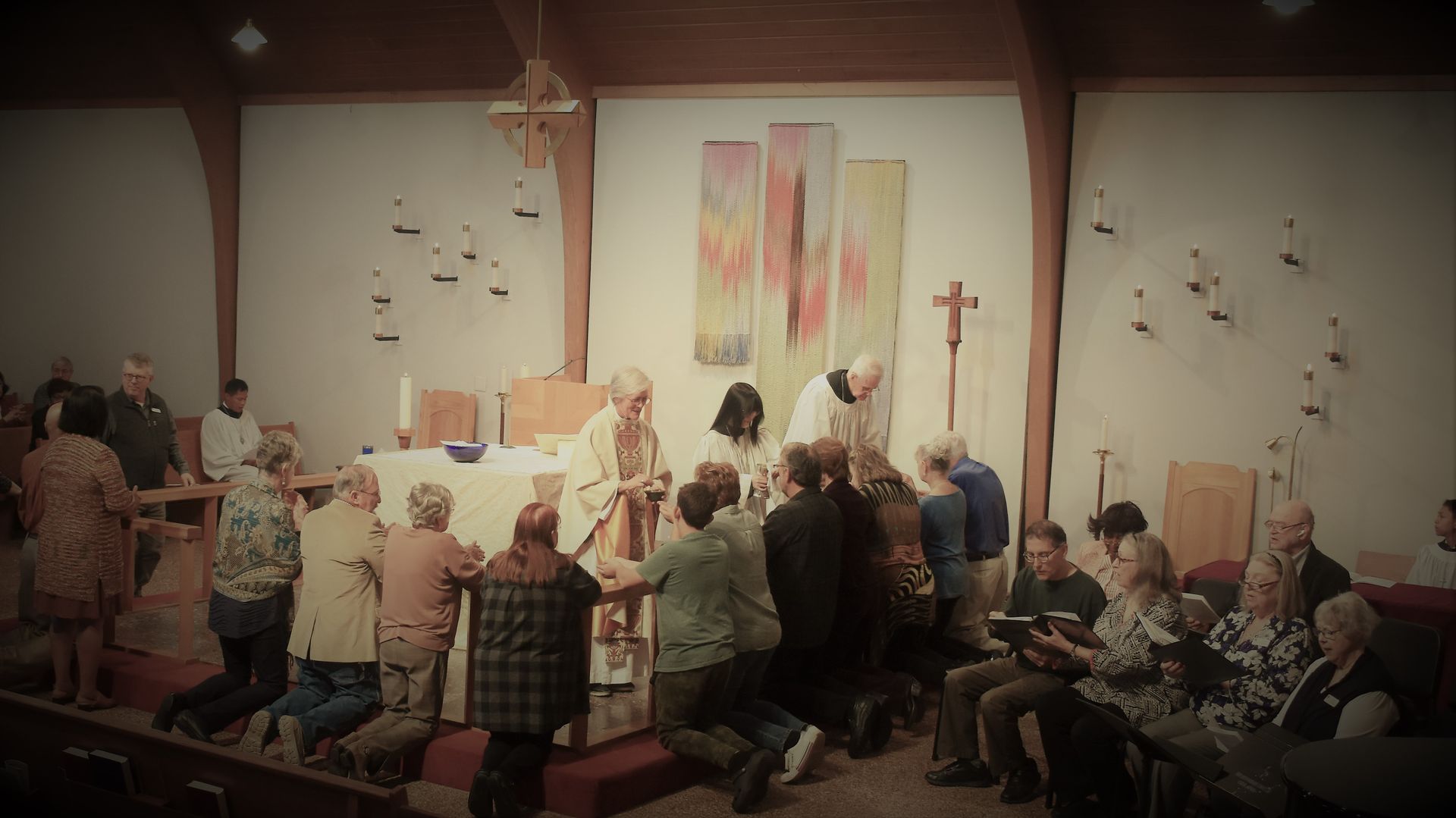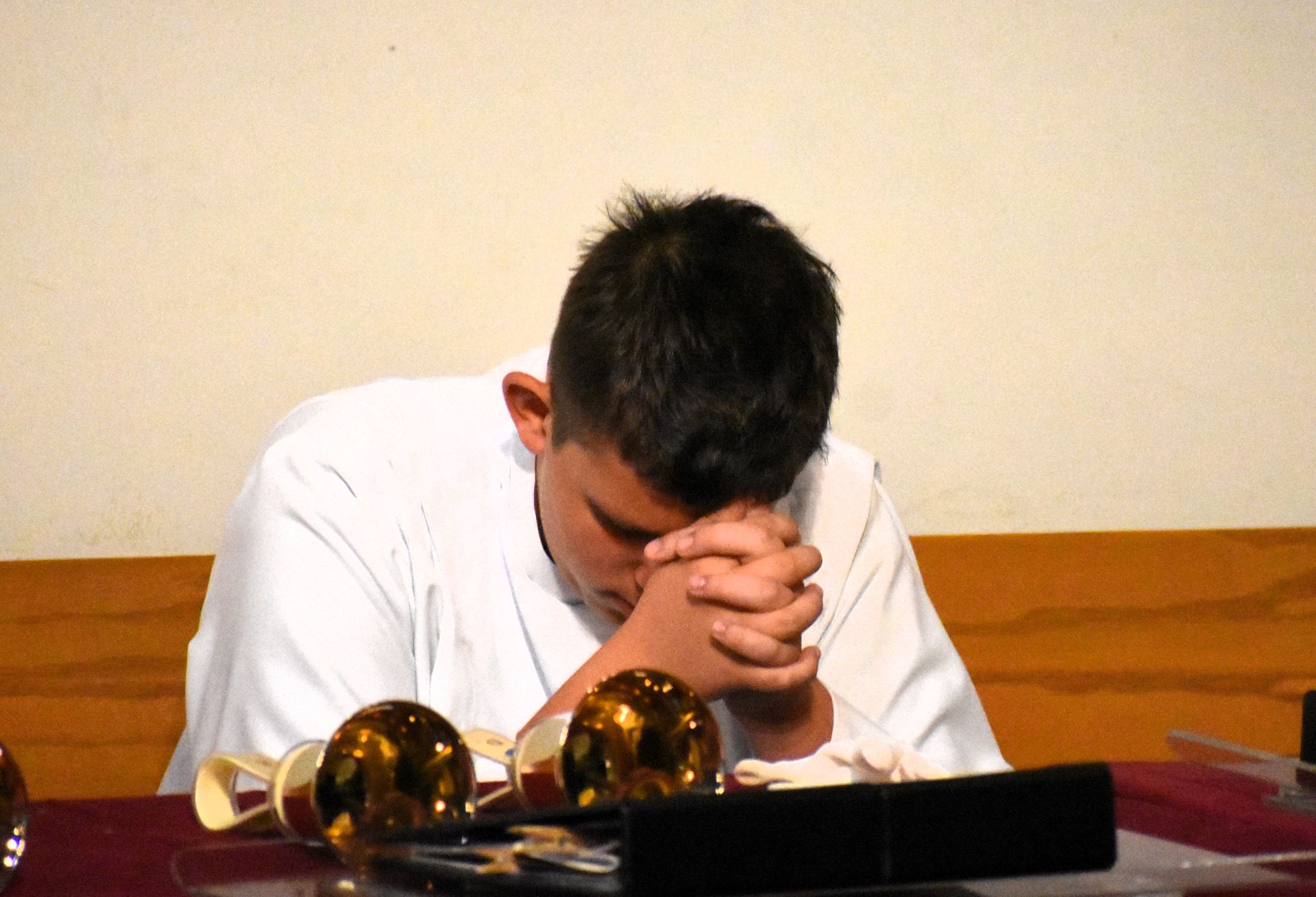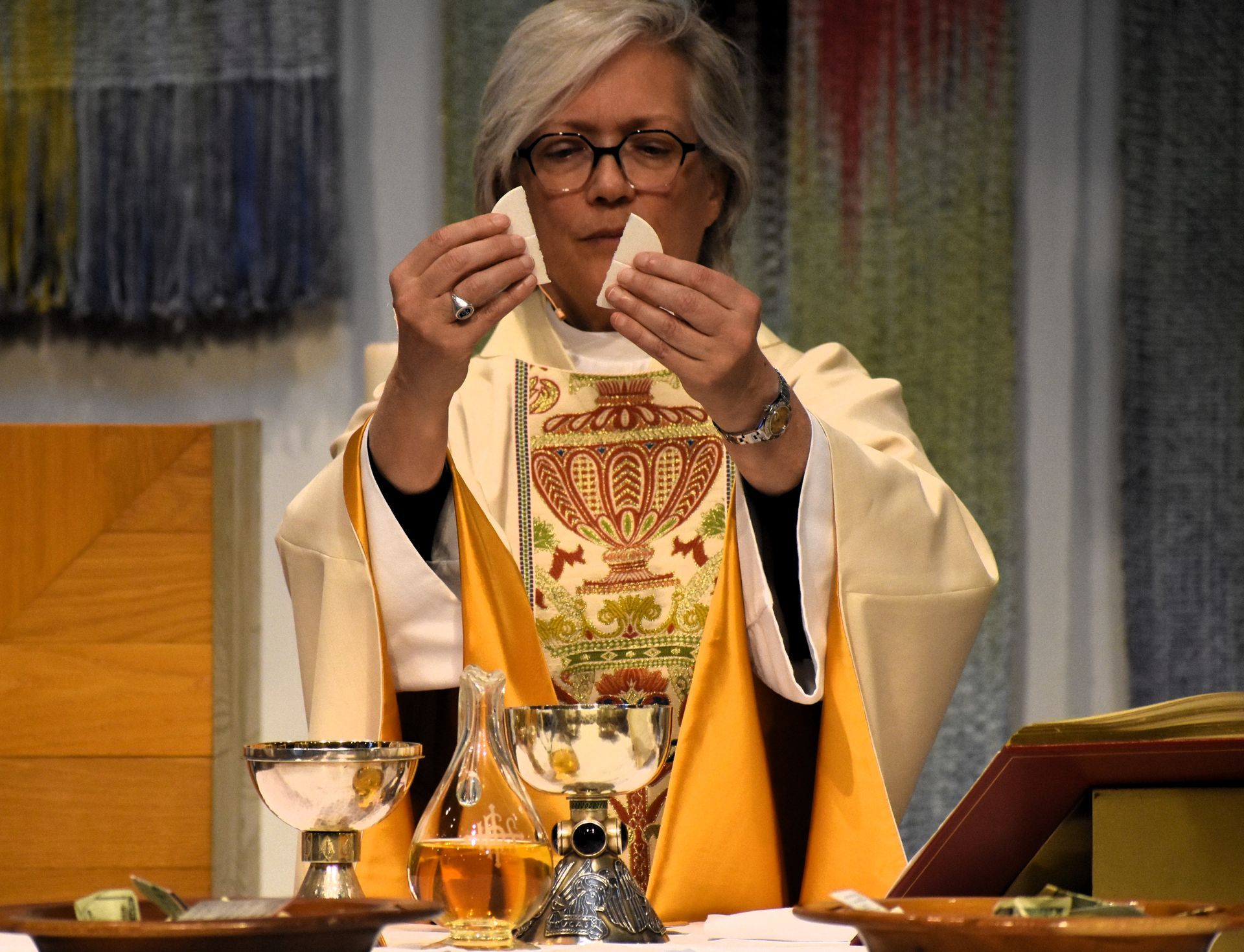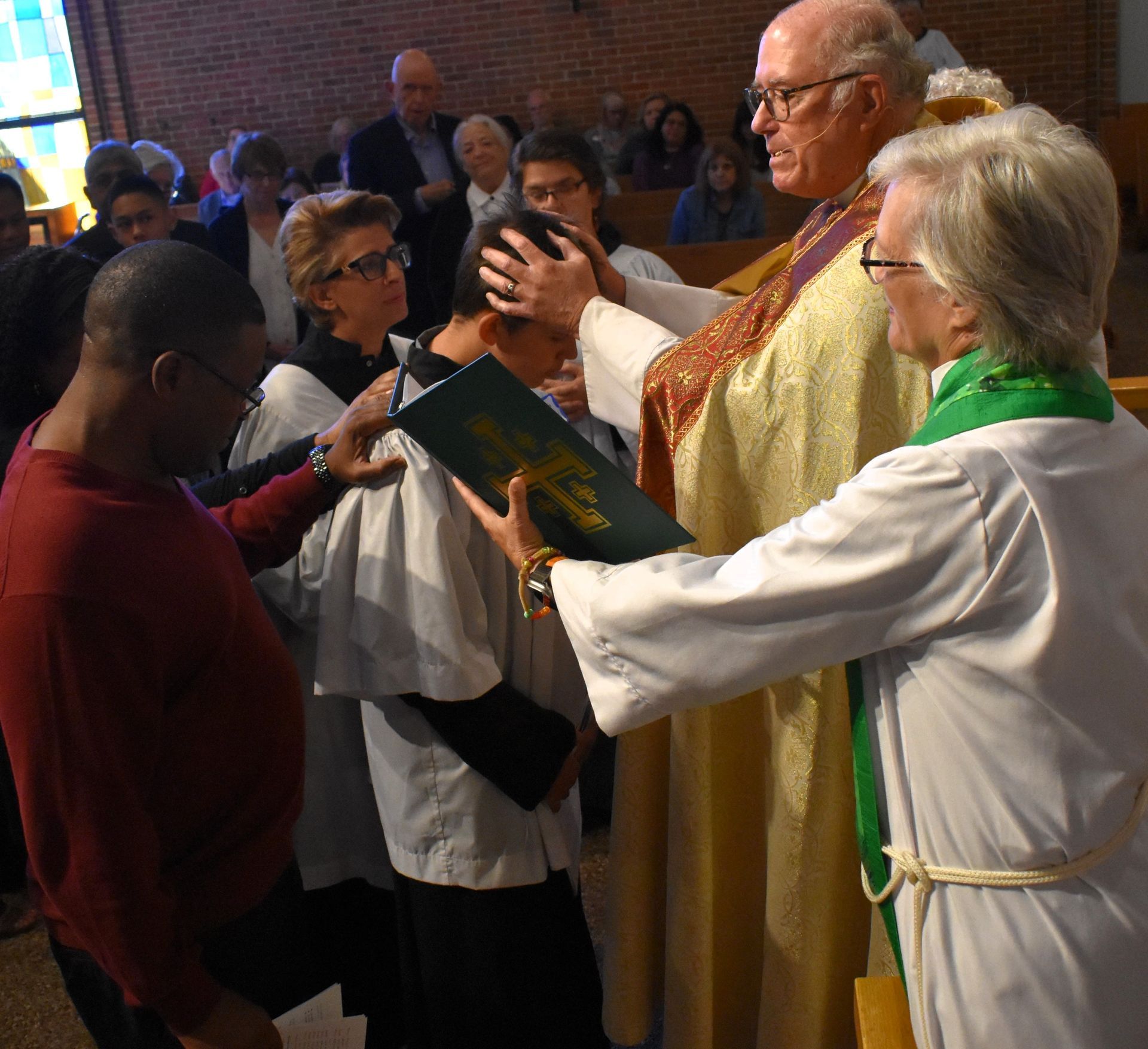Slide title
Write your caption hereButton
SACRAMENTS
Sacraments are outward and visible signs of inward and spiritual grace. The Church uses physical things as signs of invisible processes. Water is the sign of union with Christ for those who have been baptized. Taking the blessed bread and wine is the sign of our forgiveness and union with Christ and one another. These and other sacraments assure us of God's love for us.
-
Baptism
Baptism is the initiatory rite of the Christian Community. In the words of the Catechism, "Holy Baptism is the sacrament by which God adopts us as his children and makes us members of Christ's Body, the Church, and inheritors of the kingdom of God."
When we are immersed in the holy waters of baptism, we are buried with Christ in his death and enabled to share in his resurrection. We are reborn to new life.
To begin this process, please contact Rev. Paula Jefferson to register yourself or your child for baptism.
-
Holy Eucharist
On his last night of mortal life, Jesus shared a sacred meal with his disciples. He broke a loaf of bread and passed around a cup of wine and told them that this food and drink were his body and blood – that he was sharing himself with them – and then he encouraged them to keep sharing this meal in the future as a way to remember and experience him. We’re still sharing that meal today.
In communion, we not only remember Jesus’ life, death, and resurrection, we also experience his presence in our midst ... in this moment. Christ offers us spiritual food and drink to nourish and sustain us.
All baptized Christians are invited to share in communion, and that goes for children, too.
-
Confirmation
The Episcopal Church urges all its baptized members to make a mature public affirmation of their baptismal promises, and since the earliest centuries of the Church, this happens in the presence of a bishop, who “confirms” their faith. Though often seen as a rite of passage for teenagers, in truth Confirmation is appropriate for people at any stage of life who are ready to make this important affirmation.
New members' classes are scheduled as needed throughout the year. While learning about the worship and work of the Episcopal Church, participants are encouraged to consider and, as able, to share their own spiritual journeys.
Some people come to The Episcopal Church from other Christian traditions and have already experienced Confirmation, so they are “Received” by the bishop into our church. This action of “being confirmed” or “received” into the Episcopal Church demonstrates that your membership is not merely of this local parish but of the entire Christian Church of which the Bishop is representative.
Please speak to Rev. Paula if you desire to be confirmed.
-
Holy Matrimony
Marriage is the sacramental rite of the church in which two persons enter into a life-long union, make their vows before God and the Church, and receive the grace and blessing of God to help them fulfill their vows" (Book of Common Prayer, p. 861).
Marriage in the Church is a great blessing that also carries the responsibility of the vows made at baptism - regular attendance at Sunday worship, participation in the life of the parish, and continuing Christian Education.
Some may be reluctant to make such a commitment to the Church as they start their lives together. In that case, we recommend other arrangements for legal marriage, and when the couple is ready to engage with the Body of Christ, they may arrange with Rev. Paula for a blessing of their union in the Church.
Three pre-marital instruction sessions (usually on successive Saturdays/Sundays) with Rev. Paula or another credentialed provider will be scheduled prior to your marriage. These sessions are intended to strengthen your relationship, anticipate some common problems, and help you envision the future on common ground.
If you have been previously married, please provide Rev. Paula with your divorce decree. Since the Church is providing a document (your marriage license) to the State of Texas concerning the legitimacy of your upcoming marriage, it is required to certify your ability to enter into that marriage. This also provides an opportunity for counsel and advice concerning issues that may have affected previous marriages. Since the Bishop's consent is required for Rev. Paula to perform a marriage for previously married persons, please factor this into your scheduling a wedding date.
To begin this process, please make yourself known to her, and she will be glad to meet with you to schedule premarital sessions and a wedding date.
-
Unction
Unction is the “rite of anointing the sick with oil, or the laying on of hands, by which God’s grace is given for the healing of spirit, mind, or body” (from The Book of Common Prayer, p 861). We believe in the healing power of science and medicine, but we also believe that restoration to full health is a spiritual and emotional, as well as physical, matter, and the Holy Spirit of God is the ultimate healer.
-
Reconciliation of a Penitent
During his earthly life, it was not only Jesus’ miraculous power that astounded and transformed people, but also his willingness to forgive sins, including the sins of people his society considered beyond redemption. Forgiveness is central to Jesus’ identity, and our experience of his merciful forgiveness is central to how he saves and heals us.
In nearly all of our worship services, just before we share communion we confess our sins. After a time of reflective silence, the whole congregation shares in a confession: “We confess that we have sinned,” we say together, acknowledging that we have not always loved God with our whole heart or our neighbors as ourselves. It is our humble request for forgiveness, which God then grants freely.
However, it is often the case that confessing our sins more privately, and specifying with intention the things we have done that have taken us further away from God, can be a deeply cathartic experience. We can only repent from, that is, genuinely turn away from, things of which we are consciously, thoughtfully aware. And when we say those things aloud in the presence of a priest, it not only helps us empty ourselves of our guilt, but it also allows us to hear directly and personally that God forgives us.
All people are invited to share in this holy rite, and you may make an appointment with our priest to hear your private confession.
-
Christian Burial
In the Episcopal Church, burial is considered an Easter celebration. Some might be surprised to see white vestments, hear celebratory music, and even laughter at an Episcopal burial service. The Church's ministry to those who grieve is available to anyone who desires it.
A great kindness we can offer our families is to prepare for our burial by pre-planning our service and burial arrangements. Forms are available at the church office to help select readings and hymns, along with other details : flowers, reception particulars, and personal preferences related to the liturgy.
Please call the Church office to speak to Rev. Paula about arrangements.







